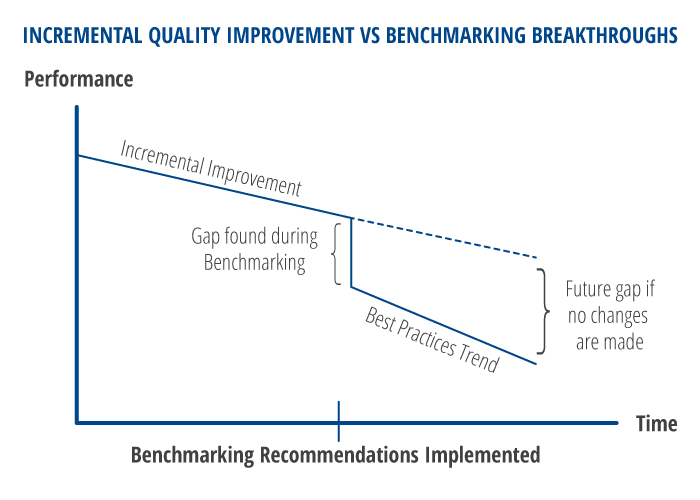Construction is a unique yet truly diversified industry, because no two companies can be exactly the same. Though companies compete in the same market segments with one another, the make-up of leadership, staff and the overall business model will not only vastly differ from one company to another, but can also differ within the same company, with change in management, processes, project awards and other fluctuating circumstances. Yet, even with all of the uniqueness of each of our businesses, there are consistencies within them or external influences that can be measured. When we have those measurement tools, they can be an effective way to help stabilize the company and better manage the unmeasurable aspects of business. This is where benchmarking comes in.
WHAT IS BENCHMARKING?
Benchmarking is defined as “the process of measuring products, services, and processes against those of organizations known to be leaders in one or more aspects of their operations” (ASQ). Benchmarking provides necessary insights to help understand how your organization compares with similar organizations, even if they are in a different business or have a different clientele.
Benchmarking can also help organizations identify areas, systems, or processes for improvements—either incremental (continuous) improvements or dramatic (business process re-engineering) improvements.
(source: https://asq.org/)
Brandon Dougherty, CPA and Senior Manager with Chris Marie, CPA/Partners group at HBK offers benchmarking reports for the Construction Industry. He took time to share with us:
“ WHY YOUR CONSTRUCTION COMPANY NEEDS A BENCHMARKING REPORT”
In a competitive marketplace, it is not for pride that a company should want to know how they compare with their competitors. An industry benchmarking report can help a contractor uncover areas of strength which can be built upon, and weaknesses which can be addressed, to improve their bottom line. It can serve as a self-checkup to ensure their company is performing at its optimal level.
Knowing where you stand in your marketplace and how your operational and revenue/growth performance compares to companies vying for the same customers is the key to remaining competitive. A benchmarking analysis is a specific type of market research that allows organizations to compare their existing performance against those of companies with similar scopes and services. This enables construction company owners and operators to make improvements that complement their overall business approach and ultimately benefit the company’s profitability. The main objectives of benchmarking analyses are to determine which improvements are necessary and where they are applicable, to scrutinize how successful competitors achieve their high performance levels, and to use the data gathered to improve efficiencies, operations, and the overall performance of the company.
Industry best practices are not always so clearly defined in the construction industry, where in the United States nearly 90% of businesses are privately owned and financial data are closely guarded. CPAs who specialize in the construction industry have access to this data and possess an intimate understanding of the industry. They can provide contractors with a better understanding of their place in the industry and assess their performance relative to the norms of an industry segment. They also know how to extrapolate the data and apply it to your benefit. They can benchmark a contractor’s performance relative to a niche or region and use that comparative analysis to determine key performance indicators, and also help correct weaknesses with best-in-class practices.
Benchmarking against companies of similar size, geographic region, and scope of service allows a contractor to evaluate his company’s financial performance by comparing key performance indicators (KPIs) against those of their peer group. KPIs include working capital, backlog, return on equity and assets, and generated revenue. Benchmarking also helps determine the effectiveness of operational functions such as billing, collection, labor force efficiency, and debt leveraging. By drawing these comparisons, a contractor is able to assess the overall productivity and profitability of his organization.
There is always room for improvement in any company, and those who neglect—or even fail—to identify their shortcomings will eventually find that their competition has left them in their dust.
Although Peer Groups, Tech Groups, and programs like Six Sigma are offered through industry associations, independent consulting groups, and even our university systems, knowing what group is best for you might start with a benchmarking report to learn more about your business itself.
Measure what matters to learn, take time to look outside your business to explore further, and define your deliverables—not just with your projects, but with your overall business. Yes, this may require an investment of time and money and could provide more information than you need. But it may provide heretofore hidden information that differentiates and solidifies your business.
To Looking Outside to Better See the Inside,
Suzanne Breistol




